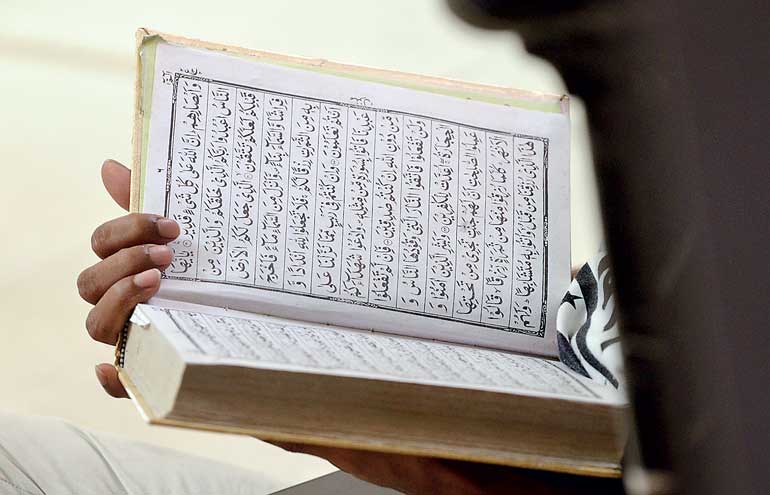Saturday Feb 21, 2026
Saturday Feb 21, 2026
Tuesday, 2 November 2021 01:25 - - {{hitsCtrl.values.hits}}

As much as the Muslim Law quintessentially binds the ethno-social and religio-cultural imperatives of the Muslim social psyche, so do the laws relating to those subjected to Thesavalamai and Kandyan law. To undermine their foundation by diluting its authority, scope and application will have negative consequences of seismic proportion – Pic by Shehan Gunasekara
 The objective of this column is to stress on the necessity for Sri Lanka to comprehend the legal diversities in vogue globally under the genre of contemporary jurisprudence. The rapid evolution of human behavioural patterns in the socio-political-economic landscapes geographically, both at State and global levels, beg this diversity.
The objective of this column is to stress on the necessity for Sri Lanka to comprehend the legal diversities in vogue globally under the genre of contemporary jurisprudence. The rapid evolution of human behavioural patterns in the socio-political-economic landscapes geographically, both at State and global levels, beg this diversity.
In the Journal of Law & Society Review, American anthropologist Sally Engle Merry writes, “The intellectual odyssey of the concept of legal pluralism moves from the discovery of indigenous forms of law … to debates concerning the pluralistic qualities of law under advanced capitalism. Legal pluralism is a central theme in the reconceptualisation of the law/society relations.”
In Sri Lanka, diverse legal systems namely, Kandyan law, Thesavalamai and Muslim law have been in existence from ancient times. This richness is something that has to be protected and valued as part of this country’s legal heritage. Today, the debate is on the inevitability of embracing plural legal systems.
Uniformity versus pluralism
Twenty-first century jurists are engaged in widening the scope of legal concepts on the face of this reality. Commenting on the frozen mindset of the lawyers, Senior research scholars say, “It seems that, rather than recognising plurality of law, lawyers have sought to define what is, and what is not, within the ‘law’. Such efforts have led to defining away the plurality of law, pulling analysis towards unification and uniformity.” (Sack & Aleck 1992: xviii).
Here in Sri Lanka, unfortunately, this is exactly what is going to happen. Moving away from pluralism towards uniformity. Either because of the lack of juristic minds or stultification of its growth. In the absence of such, the ignorant politicians revel at the talk about ‘one country, one law’ – a jurisprudentially backward model?
Historically, the colonisers were known to reshape the social life of the country they colonised by the introduction of what was perceived as civilised laws and abolishing indigenous ancient practices. This was evident, in the Kandyan kingdom when all forms of barbaric penalties were abolished by the British. The King’s justice was such that if the criminal escapes, the King would not hesitate to put to death even the wife and children of that criminal.
Other forms of punishments included the tearing of limbs from the body by elephants, slow penetration of spike into the body through the anus, etc. The arrival of the British would have been a gift for those subjected to anarchy and terror. They were freed from the scourges of tyranny and fear that gripped their lives.
Muslim Law under colonialists
It is noteworthy that none of the colonisers ever interfered with the Muslim worship and legal practices. It has been recorded by historians that when the Portuguese arrived in 1505, the Muslims living in “Ceylan” were practising their religion and dealt with issues using Islamic jurisprudence. The Dutch who had earlier occupied the Indonesian archipelago saw the Muslims resident there practising Islam. When the Dutch arrived in Ceylon, they found Muslims of Ceylon were following the same worship and practise of Muslim religious laws. This encouraged them to introduce portions of the Statutes of Batavia into Sri Lanka in 1776.
When the British invaded the island, they respected the personal laws practised by the Muslims. They codified it as the Mohamedan Code of 1806. The laws were never changed nor interfered with by the Portuguese, Dutch and the Britishers as they were already well aware of the richness of Islamic jurisprudence. These countries themselves had benefited by it. In the same manner, Thesavalamai and Kandyan law too, have lived through all these conquests and the vagaries of time.
Legal pluralism and ignorance
The question as to how far does society shape the law and, in turn, how far does law shape the society indicates the nexus between these two institutions in any discussion on legal pluralism. The purpose of law, as we all know, is to regulate social relations. Social relations of community can be analysed in terms of actions which link and bond people.
Max Weber’s sociology typifies four major categories of social actions. Two types of social action relevant to this exposition are rational action and traditional action. Rational action may be value-oriented (wertrational). Action that is determined by a conscious belief in the value for its own sake of some ethical, aesthetic, religious or other forms of behaviour, independently of its prospects for success. Those engaging in traditional action seek the means of action which are fixed by custom and tradition based on the community’s belief or values founded on shared fundamental beliefs for example, religious beliefs.
The use of the Muslim personal laws and other personal laws have been the living legal experience of a section of the inhabitants in this country. To straitjacket and assimilate this living experience within the context of a dominant legal system would demand a huge socio-religious transformation. A transformation which would be detested. Contemporary philosophy of law, which deals with general jurisprudence, addresses problems internal to law and legal systems and problems of law, as a social institution that relates to the larger political and social context in which it exists. (Shiner, ‘Philosophy of Law’).
Pluralism has been seen as treating law and justice as fundamental institutions of the basic structure of society mediating “between political and economic interests, between culture and the normative order of society, establishing and maintaining interdependence, and constituting themselves as sources of consensus, coercion and social control”. (Scuro 2010: 64)
Law and other disciplines
Further, in the present approach to legal pluralism, there is a serious inquiry to legitimately incorporate the non-positive sources (e.g., morality, custom, community attitudes) in the exercise of adjudication. By this the law has been impacted by several social disciplines related to this approach. A somewhat similar argument may be based on the Dualist approach, rather than, the Monist in the field of international law.
The Monist approach, which is attributed to Hans Kelson, positions itself by expecting all nations to bind themselves under that umbrella of natural law leaving aside their individual State decisions. In this method, there arises a conflict between international law and the primacy of Municipal law. The latter being sovereign law. The practical solution adopted by many States to overcome this conflict is to adopt a blend of both Monism and Dualism in its approach to international law. The strategic objective of international law was to advance the rule of law between nations in the international sphere.
The Monist view is a broad analogy of our local ‘one country, one law’ idea. As far as establishing the rule of law is concerned in Sri Lanka, there is no hindrance from the Thesavalamai, Muslim Personal Law or Kandyan Law. Why cannot Sri Lanka live, as it had been for several centuries, with a blend of these personal laws is an intriguing question?
Professor of Legal Theory Roger Cotterrell advances the thought that ‘community’ should be a central concept of contemporary legal theory. He writes, “The philosophers have failed to study law as a diverse, varied social and historical experience; … legal ideas and practices do not exist in abstraction but are encountered, interpreted, understood... by diverse emotional attachments, traditions, beliefs and values. (‘Community As A Legal Concept’)
Society of the highest order
As much as the Muslim Law quintessentially binds the ethno-social and religio-cultural imperatives of the Muslim social psyche, so do the laws relating to those subjected to Thesavalamai and Kandyan law. To undermine their foundation by diluting its authority, scope and application will have negative consequences of seismic proportion.
“What is a society? Society is the sum total of the human associations that have mutual relations with one another. Society of the highest order is “a society consisting of the civilised nations of the earth; within this society are various narrower societies, e.g., a society of the Christian and of the Mohammedan nations, and lastly societies that comprise only the individual civilised nations.” (Ehrlich’s Sociological Theory of Law.)
The politically-motivated ‘one country, one law’ humiliates this ‘Society of Highest Order’ which, as civilised nations, accept minority special laws. Through this parochialism, the supporters of one country one law wants to transform society into the old Austinian sovereignty: “A determinate human superior, not in a habit of obedience to a like superior, receive habitual obedience from the bulk of a given society…” (Austin – Lectures on Jurisprudence).
Thereby, degrading and departing from the modern trend of legal pluralism and legal sociology. Like Ehrlich propounded, the facts of law existed before any positive law arose. These facts of the law are social structures to be found wherever human beings are living together. Thus: “The family is older than the order of the family; possession antecedes ownership; there were contracts before there was a law of contracts.” (Ehrlich’s Sociological Theory of Law).
With special reference to the Muslim Marriage and Divorce Act, it is a special law. It is a manifestation of a collective social consciousness of a community of people having intrinsic religious relevance. A law that has been inherited by intergenerational transmission over several centuries.
There is a growing recognition of legal pluralism as a global reality. “Legal pluralism exists everywhere and comparative research therefore, needs to assess degrees of legal pluralism rather than questioning its existence.” (Woodman (199:54).
The way forward is therefore, for a plural and diverse legal system and not the regressive ‘one country, one law’. The country must move forward and not backward.
[The writer, LL. B (Hons.) (U.K), Attorney at Law, is a former Legal and Corporate Advisor and can be reached via email: [email protected]]